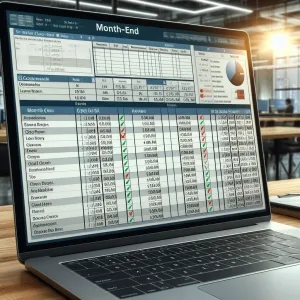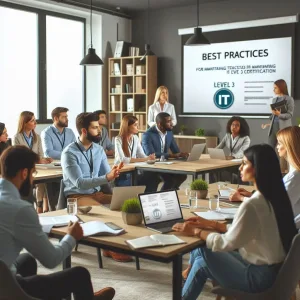In the evolving landscape of internal auditing, hybrid accounting jobs and roles have emerged as a vital component of the profession. These positions blend traditional auditing skills with modern technological competencies, reflecting the dynamic nature of the business environment.
Definition of Hybrid Internal Audit Roles
Hybrid internal audit roles (or hybrid accounting jobs) are positions that require a combination of traditional auditing expertise and advanced technological skills. These roles often involve not only the assessment of financial and operational processes but also the integration of data analytics, risk management, and compliance with regulatory standards. Internal auditors in hybrid roles are expected to navigate both the quantitative aspects of auditing and the qualitative insights derived from data analysis.
Emergence of Hybrid Roles
The rise of hybrid roles in internal audit can be attributed to significant technological advancements and the shifting demands of the business landscape. As organizations increasingly rely on digital tools and data-driven decision-making, the need for auditors who can interpret complex data sets and leverage technology has become paramount. This shift has been accelerated by the growing importance of risk management and compliance in a rapidly changing regulatory environment, prompting organizations to seek professionals who can adapt to these new challenges.
Importance of Hybrid Roles
Hybrid internal audit positions play a crucial role in enhancing the effectiveness and efficiency of audit functions. By combining traditional auditing practices with innovative technologies, these roles enable organizations to conduct more thorough and timely audits. The integration of data analytics allows auditors to identify trends, anomalies, and potential risks more effectively, leading to improved decision-making and strategic planning. Furthermore, hybrid roles facilitate a more proactive approach to auditing, enabling organizations to anticipate issues before they escalate into significant problems.
Hybrid internal audit roles represent a significant evolution in the field, driven by technological advancements and the need for greater efficiency in audit processes. As we delve deeper into the essential skills required for success in these positions, it is clear that a blend of traditional auditing knowledge and modern technological proficiency is essential for thriving in this new era of internal auditing.
Understanding the Hybrid Model
The hybrid model in internal auditing represents a significant evolution in the way accounting professionals approach their roles, blending traditional accounting practices with modern technology-driven tasks. This shift is largely driven by the increasing complexity of data and the need for organizations to adapt to a rapidly changing business environment.
Explanation of Hybrid Roles
Hybrid roles in internal auditing (or hybrid accounting jobs) combine core accounting functions with advanced technological skills. Professionals in these positions are expected to analyze large data sets, extract meaningful insights, and provide strategic guidance to their organizations. This requires a unique skill set that encompasses both technical auditing skills and a strong understanding of data analytics and technology. As a result, hybrid auditors must be adept at using cloud-based software and other digital tools to enhance their auditing processes and improve efficiency [1].
Examples of Hybrid Positions in Internal Audit
Several hybrid positions have emerged within the field of internal auditing, reflecting the demand for professionals who can navigate both traditional and modern auditing landscapes. Notable examples include:
- Data Analyst Auditor: This role focuses on analyzing financial data to identify trends, risks, and opportunities for improvement. Data analyst auditors leverage advanced analytical tools to enhance the audit process and provide actionable insights [1].
- IT Auditor: IT auditors assess the effectiveness of an organization’s information systems and technology controls. They ensure that data integrity and security measures are in place, which is increasingly important as businesses rely on technology for their operations.
These positions highlight the necessity for auditors to possess a blend of accounting knowledge and technical expertise, enabling them to address the complexities of modern auditing challenges.
Discussion on the Balance Between Remote and On-Site Work
The hybrid model also introduces a flexible work environment, where professionals can balance remote and on-site responsibilities. Many organizations are adopting a hybrid work schedule, allowing auditors to work in the office for part of the week while providing the option to work remotely on other days. This flexibility not only enhances work-life balance but also allows firms to tap into a broader talent pool, as geographical constraints become less of a barrier [5][14].
The hybrid model in internal auditing is reshaping the landscape of accounting roles. By blending traditional skills with technology-driven competencies, auditors can better navigate the complexities of today’s business environment, making them invaluable assets to their organizations. As the demand for hybrid skills continues to grow, professionals in the field must adapt and develop their capabilities to thrive in this evolving landscape [11][15].
Essential Competencies for Hybrid Internal Audit Positions
In the evolving landscape of internal auditing, hybrid accounting roles are becoming increasingly prominent. These positions require a unique blend of skills that encompass both traditional auditing competencies and modern technological proficiencies. Below are the key skills essential for success in hybrid internal audit roles:
- Technical Skills: A strong foundation in accounting principles and auditing standards is crucial. Professionals must be well-versed in relevant software tools, such as SAP and MS Office, to effectively perform their duties. This technical expertise ensures that auditors can accurately assess financial statements and compliance with regulations [3].
- Analytical Skills: The ability to analyze complex data sets is vital in hybrid roles. Internal auditors must derive actionable insights from data to inform decision-making and risk management strategies. This analytical capability allows auditors to identify trends, anomalies, and areas for improvement within an organization [10].
- Technology Proficiency: As the field of internal auditing increasingly integrates technology, familiarity with data analytics tools and cybersecurity principles becomes essential. Auditors should be adept at using digital auditing techniques to enhance efficiency and effectiveness in their work. Understanding how to leverage technology for risk assessment and compliance is a significant advantage in hybrid roles [12].
- Communication Skills: Clear communication is paramount in internal auditing. Professionals must effectively convey findings and recommendations to stakeholders and team members, both verbally and in writing. Strong communication skills facilitate collaboration and ensure that audit results are understood and acted upon [10].
- Adaptability: The ability to adapt to new tools, processes, and regulatory changes is critical in the dynamic environment of internal auditing. Hybrid auditors must be flexible and open to learning, as the landscape continues to evolve with advancements in technology and shifts in regulatory requirements [11].
Thriving in hybrid internal audit positions requires a combination of technical expertise, analytical prowess, technological savvy, effective communication, and adaptability. By cultivating these competencies, internal auditors can position themselves for success in a rapidly changing field.
How to Acquire and Enhance These Skills
In the evolving landscape of internal auditing, hybrid accounting roles are becoming increasingly prominent. These positions require a unique blend of technical and soft skills, making it essential for professionals to continuously develop their competencies. Here are some actionable strategies for internal auditors and job seekers to thrive in hybrid roles:
- Educational Pathways: Pursuing relevant certifications is crucial for enhancing your qualifications. Certifications such as the Certified Internal Auditor (CIA) and Certified Information Systems Auditor (CISA) are highly regarded in the industry. These credentials not only validate your expertise but also equip you with the necessary knowledge to navigate complex audit environments effectively. Additionally, consider enrolling in courses that focus on data analytics, risk management, and financial acumen, as these areas are increasingly important in hybrid roles [11][12].
- Continuous Learning: The field of internal auditing is dynamic, and staying updated with the latest trends and technologies is vital. Attending workshops, webinars, and industry conferences can provide valuable insights and enhance your skill set. These events often feature expert speakers and offer opportunities to learn about new tools and methodologies that can improve audit quality and efficiency [3][9]. Engaging in continuous education helps you remain competitive and adaptable in a rapidly changing job market.
- Networking: Building connections with professionals who are already in hybrid audit roles can be immensely beneficial. Networking allows you to gain insights into the skills and experiences that are most valued in these positions. Seek out mentorship opportunities where you can learn from seasoned auditors who can provide guidance and share their experiences. Joining professional organizations and participating in online forums can also facilitate connections with peers and industry leaders [2][10].
- Practical Experience: Gaining hands-on experience is essential for developing the competencies needed for hybrid roles. Look for internship opportunities or consider participating in cross-functional projects within your organization. These experiences can provide you with a deeper understanding of different business functions and enhance your ability to assess risks and controls effectively. Practical experience not only builds your resume but also helps you apply theoretical knowledge in real-world scenarios, making you a more competent auditor [4][15].
By focusing on these key areas, internal auditors and job seekers can effectively enhance their skills and position themselves for success in hybrid accounting roles. Embracing a proactive approach to learning and networking will not only improve your professional profile but also contribute to the overall effectiveness of internal audit functions in organizations.
The Future of Hybrid Internal Audit Positions
As the landscape of internal audit continues to evolve, hybrid accounting jobs are becoming increasingly prominent. These positions blend traditional auditing skills with modern technological competencies, creating a unique set of requirements for professionals in the field. Here are some key points to consider regarding the future of hybrid internal audit positions:
Impact of Emerging Technologies
The integration of emerging technologies such as artificial intelligence (AI) and machine learning is transforming internal audit practices. These technologies enable auditors to:
- Enhance Data Analysis: AI and machine learning facilitate the analysis of large datasets, allowing auditors to identify patterns and anomalies more efficiently than traditional methods. This capability is crucial for real-time assurance and risk assessment, which are becoming essential in today’s fast-paced business environment [2].
- Automate Routine Tasks: By automating repetitive tasks, auditors can focus on more strategic activities, such as risk management and organizational improvement. This shift not only increases efficiency but also enhances the overall value that internal audit functions provide to organizations [1].
- Adapt to Hybrid Auditing: The rise of hybrid auditing—combining in-person and remote audit practices—requires auditors to be proficient in using digital tools and platforms. This adaptability is vital as organizations continue to embrace flexible work arrangements.
Predictions on Demand for Hybrid Roles
The demand for hybrid internal audit roles is expected to grow significantly in the coming years. Factors contributing to this trend include:
- Increased Complexity of Risks: As organizations face more complex risks, the need for auditors who can navigate both traditional and digital landscapes will rise. Hybrid auditors will be essential in addressing these multifaceted challenges [1].
- Focus on Real-Time Assurance: The need for real-time assurance has never been more critical. Organizations are increasingly looking for auditors who can provide timely insights and recommendations, making hybrid roles more valuable [2].
- Skill Shortages: The internal audit profession is experiencing a skills gap, particularly in areas related to technology and data analytics. Hybrid roles that require a blend of traditional auditing skills and technological expertise will be in high demand as organizations seek to bridge this gap [10].
Driving Organizational Change and Innovation
Hybrid auditors play a pivotal role in driving organizational change and innovation. Their unique skill set allows them to:
- Facilitate Digital Transformation: By understanding both audit principles and emerging technologies, hybrid auditors can guide organizations through digital transformation initiatives, ensuring that internal controls are maintained while embracing innovation [7].
- Enhance Workforce Planning: Hybrid auditors can appraise workforce planning practices and help organizations develop strategies for talent acquisition and retention, addressing the impacts of skill shortages and turnover.
- Promote Continuous Learning: The evolving nature of internal audit necessitates a commitment to continuous learning. Hybrid auditors must stay current with industry trends and pursue professional development opportunities to remain effective in their roles [6].
The future of hybrid internal audit positions is bright, with emerging technologies reshaping the profession and creating new opportunities for auditors. As organizations increasingly recognize the value of hybrid accounting jobs, professionals in the field must adapt and develop the essential competencies needed to thrive in this dynamic environment.
Conclusion
In the evolving landscape of internal audit, the emergence of hybrid accounting jobs necessitates a unique blend of competencies that professionals must cultivate to thrive. As we have explored, the essential skills for these positions encompass both technical and soft skills, enabling auditors to navigate the complexities of modern business environments effectively.
Recap of Essential Competencies:
- Technical Skills: Proficiency in risk-based auditing, accounting, and financial data analysis is crucial. A solid foundation in these areas, typically supported by 2-4 years of relevant experience, is essential for success in hybrid roles.
- Soft Skills: Interpersonal abilities such as communication, empathy, and teamwork are equally important. These skills facilitate effective collaboration with stakeholders and enhance the overall audit process [2][11].
- Adaptability: The ability to adjust to rapid changes in the business world is vital. Hybrid auditors must be agile, demonstrating a fluid mix of skills that allow them to respond to new challenges and opportunities [10].
Final Thoughts on Career Opportunities:
The shift towards hybrid auditing presents numerous career opportunities for internal auditors. As organizations increasingly adopt flexible work models, the demand for professionals who can operate effectively in both remote and in-person settings is on the rise. This trend not only enhances the relevance of internal audit functions but also positions auditors as key contributors to organizational success [14][10].
Encouragement for Skill Development:
As the internal audit profession continues to evolve, it is imperative for auditors and job seekers to invest in their skill development actively. Embracing a hybrid skill set will not only enhance individual career prospects but also ensure that professionals remain competitive in a dynamic job market. By focusing on both technical and soft skills, internal auditors can position themselves for success in the future of work [11][12].
In conclusion, the journey towards mastering the competencies required for hybrid internal audit positions (ro hybrid accounting jobs) is ongoing. By prioritizing skill development, professionals can unlock new opportunities and contribute significantly to their organizations in this transformative era.
Find out more about Shaun Stoltz https://www.shaunstoltz.com/about/
This post was written by an AI and reviewed/edited by a human.



